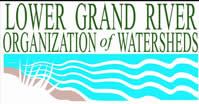Lower Grand Watershed Interactive Tool (WIT) - Septic Systems

FYI on Local Water Issues
Septic systems are a common waste disposal tool. In a traditional septic system, solid materials remain in the septic tank where they partially decompose. Liquids pass through the drainfield (a system of perforated pipes) into the soil. The solid waste in the septic tank (called septage) builds up over time and must be removed by a professional. This traditional septic system provides a low cost, low energy way of disposing of human waste. It is, however, subject to problems. A poorly functioning septic system can release excessive pollutants. This can cause health and environmental problems. Septage must either be applied to open land or in a wastewater treatment plant. Land application is often poorly regulated. Few treatment plants accept septage. Also, homeowners may ignore their system until it breaks down, causing expensive repairs and increasing pollution. Finally, conventional septic systems can't be used under all conditions. Chances are, septic systems are here to stay, especially in rural areas. Given their potential complications, it's important that they are fully understood and maintained.
For more information on septic systems, consult the following resources:
- Principle and Design of Septic Systems
- Taking Care of Your Septic System
- Septic system alternatives
- Statewide Code for On-Site Wastewater Treatment
- Kent County Septage Management Program
- Septic system owner's guidebook
- Model ordinance for septic system maintenance
- Model ordinance for septage disposal
- Michigan Septage Hauler's Directory
- Michigan Wastewater Treatment Plants Accepting Septage
